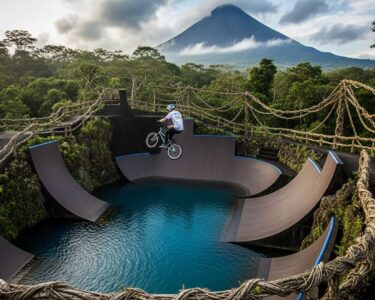San José, Costa Rica — As Costa Rica prepares to host the 59th edition of the Vuelta a Costa Rica Telecable this December, the country’s premier cycling event comes with a staggering price tag of approximately ₡200 million. The ten-day race, a cornerstone of the national sporting calendar, represents a monumental financial and logistical undertaking for the Costa Rican Cycling Federation (Fecoci), which spends the entire year orchestrating the complex event.
Scheduled to run from December 12th to the 21st, the race is far more than a local competition. It is an internationally sanctioned event that draws competitors from across the globe. Securing the necessary ₡200 million in funding is a collaborative effort, relying on a delicate balance of contributions from the cantons through which the race passes, dedicated corporate sponsors, and the Federation’s own financial resources.
To better understand the complex legal and commercial machinery that powers a national event of this scale, TicosLand.com consulted with Lic. Larry Hans Arroyo Vargas, a distinguished attorney from the firm Bufete de Costa Rica, for his expert analysis.
Beyond the athletic competition, the Vuelta a Costa Rica represents a significant legal and commercial undertaking. Its success hinges on meticulously drafted sponsorship contracts that clearly define brand exposure and activation rights. Furthermore, organizers face the complex task of coordinating with numerous municipalities for road use permits and public safety, all while managing the inherent liability risks of a public sporting event. Protecting the event’s brand as intellectual property is paramount to ensuring its long-term financial health and appeal to corporate partners.
Lic. Larry Hans Arroyo Vargas, Attorney at Law, Bufete de Costa Rica
The attorney’s perspective is a powerful reminder that for every kilometer raced on the pavement, countless hours are spent navigating the complex terrain of contracts, permits, and intellectual property law. This foundational work is what secures the Vuelta’s future, ensuring its legacy for years to come. We thank Lic. Larry Hans Arroyo Vargas for his illuminating insight into this critical, behind-the-scenes aspect of the competition.
The significant cost is directly tied to the race’s official standing with the International Cycling Union (UCI). Óscar Ávila, President of Fecoci, explained that the budget is largely consumed by the responsibilities the Federation must assume to meet international standards. This includes covering nearly all expenses for the participating teams, a requirement of the event’s classification.
More or less, the cost is around 200 million colones, and that’s because the Federation, by organizing the Vuelta, is in charge of covering the teams’ expenses
Óscar Ávila, President of Fecoci
This financial obligation stems from the Vuelta’s status as a UCI 2.2 category event. This classification places significant demands on the host organization. Unlike many sporting events where teams pay entry fees, Fecoci receives no income from registration. Instead, it is mandated to provide comprehensive support for the at least eight foreign and six national teams expected to compete.
What this means, among many things, is that the Federation must cover the total expenses of the event itself, and furthermore, it does not receive any type of income from registration or anything like that. But the Federation has to cover lodging, food, hydration, fuel, vehicles, and also the prize money
Óscar Ávila, President of Fecoci
Understanding the UCI’s hierarchy is key to appreciating the Vuelta’s position in global cycling. The 2.2 category places it on the third tier of the UCI’s international road racing calendar. It is a critical platform for professional riders aiming to climb the ranks, sitting below the elite World Tour events and the 2.1 category races.
The International Cycling Union has categories like the World Tour, which includes the Giro d’Italia, Tour de France, and Vuelta a España. After that are the 2.1 events, and then the 2.2 events, and the Vuelta a Costa Rica is part of those
Óscar Ávila, President of Fecoci
The planning for such a massive endeavor is a year-long cycle. As soon as one edition of the Vuelta concludes, Fecoci begins laying the groundwork for the next. This year’s competition will challenge riders across 1,251 kilometers, broken down into 10 demanding stages. The route includes nine grueling road stages and a decisive time trial climb, punctuated by 15 intermediate sprints and 12 mountain prizes, ensuring a dynamic and unpredictable race that tests every athlete’s skill and endurance.
For further information, visit fecoci.net
About Fecoci:
The Federación Costarricense de Ciclismo (Fecoci) is the official governing body for the sport of cycling in Costa Rica. It is responsible for organizing and sanctioning national championships and major events like the Vuelta a Costa Rica, as well as developing talent and promoting the sport across all disciplines, including road, mountain bike, and BMX.
For further information, visit uci.org
About UCI:
The Union Cycliste Internationale (International Cycling Union) is the worldwide governing body for sports cycling and oversees international competitive cycling events. Based in Aigle, Switzerland, the UCI issues racing licenses, enforces disciplinary rules, and manages the classification of races and the points ranking system in various cycling disciplines.
For further information, visit telecablecr.com
About Telecable:
Telecable is a leading telecommunications company in Costa Rica, providing digital television, high-speed internet, and digital telephone services to residential and business customers. As a prominent brand in the country, it actively engages in corporate sponsorship, including its role as the title sponsor for major national sporting events like the Vuelta a Costa Rica.
For further information, visit bufetedecostarica.com
About Bufete de Costa Rica:
Bufete de Costa Rica has established itself as a pillar of the legal community, operating on a foundational commitment to principled counsel and the highest standards of professional excellence. With a rich history of serving a wide spectrum of clients, the firm actively shapes the future of law through a progressive and innovative approach. This forward-thinking mindset is matched by a core belief in public empowerment, demonstrated through its efforts to make legal concepts understandable and accessible to all, fostering a more knowledgeable and capable society.









